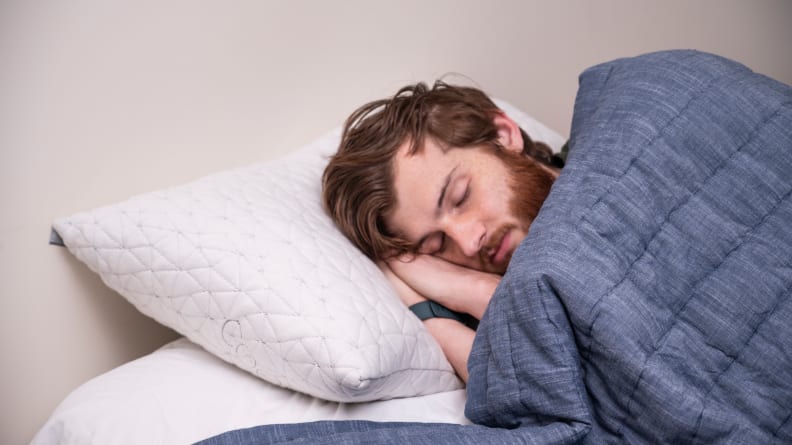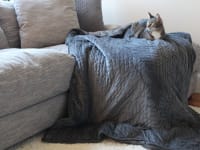Want to sleep better? Consider more exercise
Exercising during the day can help you sleep well at night.
Products are chosen independently by our editors. Purchases made through our links may earn us a commission.
Falling and staying asleep is a struggle for many people. You might already be familiar with some of our favorite pieces of sleep advice at Reviewed, like staying off your phone before bed and working meditation into your evening routine.
One oft-overlooked sleep strategy is to get some exercise during your waking hours. We spoke with sleep and fitness experts about how you can work more exercise into your day to sleep better at night.
Is there evidence that exercise helps with sleep?
A plethora of scientific research backs exercise as a sleep enhancer.
“There’s pretty firm evidence that exercise does help with sleep in terms of both initiation and maintenance,” says Dr. Charlene Gamaldo, medical director of the John Hopkins Center for Sleep and Wellness in Baltimore, Maryland.
Some research has found that as little as 30 minutes of moderate exercise is associated with getting more slow-wave sleep, Gamaldo says. Slow-wave sleep is deep sleep that is thought to play an important role in memory formation.)
Anyone can benefit from adding exercise to their routine. Research has generally found that exercise improves sleep quality across age groups, according to Brett Dolezal, director of the Airways and Exercise Physiology Research Laboratory at UCLA School of Medicine, and his research assistant Kristin Daniels. A recent paper from the UCLA lab concluded that an active lifestyle can decrease sleep onset latency, meaning that active people fell asleep faster.
The UCLA researchers say there’s evidence that regular exercise may realign the circadian rhythm, or the natural human sleep-wake cycle.
In addition, exercise can improve general health in the long-run which is positive for sleep. “We live by the axiom that exercise is medicine,” the UCLA researchers say. “Relating to sleep, it’s well known that obesity is the biggest risk factor for sleep apnea, and by regular exercise, weight can be lost and then maintained, which mitigates this most common sleep disorder.”
Exercise also has natural anti-anxiety benefits that might be good for sleep, says Gamaldo.
What kinds of exercise are best for sleep?
The good news is that almost any sort of physical activity can improve sleep. Even a brisk walk can have sleep benefits, says Gamaldo. Choice of exercise only matters as far as doing something you enjoy that gets your heart rate up.
Another piece of good news? Results from exercise kick in right away. “You don’t need to train for a marathon and you don’t need to exercise for weeks to see sleep benefits,” Gamaldo says. “It can be seen as early the night of exercise.”
What time of day should you exercise?
There isn’t one “correct” time of day for exercise. For many people, it is best to avoid exercising in the two hours before bedtime because endorphins from exercise can lead to a “pumped-up” alert feeling, says Gamaldo. But she suggests this isn’t true for everyone. “If the impact is unknown, then I always suggest folks to listen to their bodies and pursue exercise when convenient for them and during times ... that seem to be most conducive to their sleep,” she says.
The UCLA researchers say some research suggests that exercise in the morning may be better than afternoon because of the arousal that exercise can cause. One study from the University of New England suggests that the saliva of people who exercised in the morning had more melatonin, a hormone that regulates sleep, than those who exercised in the afternoon. But, other evidence suggests that exercise 90 minutes before sleep results in increased deep sleep, say the UCLA researchers.
In the end, it’s up to you. Find a time that works with your schedule and start exercising.
Does sleep improve exercise?

Getting enough sleep is important for getting a proper workout.
Research from the UCLA lab suggests that the benefits of exercise and sleep are bidirectional. Exercise improves sleep, and sleep improves exercise.
“Both sleep and exercise are key components of our health, and they go hand in hand,” says Tami Smith, an ACE-certified personal trainer based in St. Augustine, Florida. “If you're not getting enough sleep, your ability to exercise safely and efficiently will dramatically decline over time.”
In other words, being well-rested is critical for maintaining the energy to push into the training zone where physical improvement occurs.
What if you don’t have time to exercise?
Everyone is busy, but you should try to prioritize both sleep and exercise as much as possible. “You have to get really honest with yourself and let go of your excuses,” Smith says. “Analyze your day: There's likely plenty of time when you're mindlessly scrolling social media or watching a TV show where you could instead spend that time on yourself.”
You also don’t have to go to a gym or buy fancy equipment to get a workout every day. One idea is to go for a walk during your lunch break, and then eat at your desk after, Smith says. If you have kids, invite them to exercise with you rather than using them as an excuse not to work out.
You may also consider taking yoga, dance, strength or pilates exercise classes at home. There are a range of free workouts on YouTube that you can pursue. Some channels to check out include Yoga with Adrienne and Blogilates. Or download a workout app. We love Nike Training Club, which offers free classes with clear instructions targeted at your fitness level.
Finally, if you aren’t exercising or sleeping enough, try to cut back on things like watching TV at night, Smith suggests. Or implement a bedtime routine that will help you wind down and fall asleep more efficiently.
The bottom line: Making both exercise and sleep a priority in your life is the ultimate act of self-care.


